当前城市:淄博[切换]
- 手机雅思无忧

扫码登录
雅思考试主要是通过对考生听、说、读、写四个方面英语能力的考核,综合测评考生的英语沟通运用能力,实现“沟通为本”的考试理念。对于雅思考生来说,也有很多考试难点和政策盲区需要帮助解答。今天雅思无忧网小编准备了雅思口语真题teachers 专业八级考试写作范文:为什么我要上大学,希望通过文章来解决雅思考生这方面的疑难问题,敬请关注。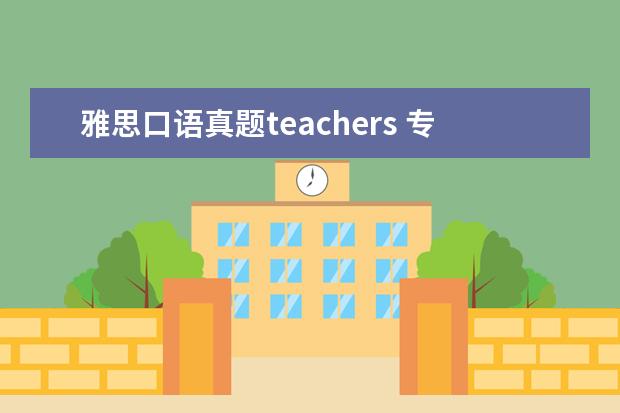
为了帮助大家备考雅思,提高雅思写作水平,下面我给大家带来雅思写作:如何分清正式与非正式英语,希望对大家有所帮助!
雅思写作:如何分清正式与非正式英语
一、正式英语
正式英语主要应用于写作中。这种文体格式通常带有学术性的写作口吻,通常见于学术课本,大学论文,商业信函和合同中。
在口语表达方面,正式英语通常只用于官方或正式场合,例如,在大学 毕业 典礼上正式欢迎来宾。
正式英语比日常用语使用更多的复杂词汇。例如,正式用语常常比日常对话使用“更庞大”的词汇。如以下几个多音节词compensate, ascend 和 interrogate。 正式用语还常常使用单个动词(如establish)来代替简单的 短语 动词(如set up)。此外,在正式用语中还要嫌氏尽量避免 俚语 和口语的出现。
当正式用语应用于写作中时, 句子 通常较长,较为复杂,也应严格遵循语法规则。正式写作中,通常较为客观,经常使用it这样的非人称代词和动词的被动形式。应该尽量避芹好散免缩略语和缩写单词的出现。
二、非正式英语和流行英语
非正式英语是大多数人们日常所说的英语。非正式英语广泛应用于电子邮件和朋友书信中。
使用非正式英语的人们对词汇的选择不太在意,如:非正式英语使用很多较短的单词(如fire, climb和 ask),使用许多口语词汇(如stuff, a lot of, thing和 sort of),还很使用一些短语动词(如使用set up ,而不用establish)。非正式英语在语法上没有正式英语要求严格,常使用简单的语法结构和比较松散的句子或短语。
在写作中,非正式英语比正式英语常常使用更加个人化的文体,常用第一,第二人称(例如I ,you, we)。缩写单词(如常常使用it's,而不是 it is)也常常见于非正式英语之中。而且,非正式英语比正式的写作句式通常更短。在正式 英语写作 中,常常使用较为正式的标点符号---而避免分号(;)和冒 号(:)的出现,非正式英语则可以出现。 流行英语很少应用于写作中,大多是用于口语之中。非正式英语中包括大量的俚语。俚语就是一些非正式的,在礼节性的演讲和正式场合常常被看作不合适的单词或短语表达。俚语常常由固定的社会团体或职袜败业人群使用。
三、关于短语动词
人们使用非正式英语谈话或写作时,经常使用短语动词(也叫做多个单词或多部分动词)。以下是几组例子。括号中是其对应的正式用语。 短语动词和其对应的单个动词
要求ask for (request)订约go down with (contract)
建立set up (establish)处理deal with (handle) 发现find out (discover)欺骗take in (deceive)
短语动词在口语中较为常见。然而,比起其对应的单个动词不太正式。
在正式写作中,作者常常更倾向于使用单个动词,例如 examine和devise,而不使用短语动词,如look at 和come up with。请对比下页表格中的每对动词。 虽然在正式英语中,倾向于使用较短的短语动词,但是如果真的使用了这些短于动词句子也不为错误。然而,如果有比短语动词更为简短的单个动词,最好使用单个动词。
不要认为在雅思写作考试中使用多个短语动词会使 文章 不太正式。实际上,在许多情景之中---甚至是在非常正式的文体中---短语动词依然是确切表达文章主旨的方式。例如,put on 比起其更加正式的用语don来说,更加自然贴切。
四、非正式用语较正式用语
他调查了(checked up on)他的会计。他调查了(investigated)他的会计。
他们容忍了( put up with)邻居们。他们容忍了( tolerated)邻居们。
她很快就理解了(caught on)。她很快就理解了(understood )。
为了弥补(made up for)它,她早早的睡了。为了弥补(compensated)它,她早早的睡了。
他发烧了( went down with)。他发烧了 (contracted )。
生活费上升了(went up)。生活费上升了(contracted)。
五、辨别不同
通常很容易的决定一个词是正式用语还是非正式用语。非正式用语就是人们每天使用的那些共同的,普通和熟悉的词,而正式用语则是更加“严肃”和较少常用的单词。 通常,正式词比非正式用语较长。单个动词比它们所对应的短语动词也较为正式。
例如,称某件东西是极大的enormous是正式的,但是要说whopping是不非正式的。象一方面on the one hand 或如上所示 as indicated above,这样的词组是正式的,但是,如顺便说一句by the way 或那提醒我that reminds me就是非正式的。
请注意:一些非正式单词比其他一些非正式的单词更为正式。例如,非正式用语understand,比非正式用语get更为正式。然而,二者均不如正式用语comprehend更加正式。
六、雅思考试使用半正式文体格式
学术文章可以使用“中间的或稍正式的文体格式”。这就意味您雅思学术文章写作中可以使用稍加正式的词汇 (例如 ,可以使用spark off 而不用 cause 这样的短语动词),还可以使用更加正式的用语。可以使用正式英语中常常使用的复杂语法,也可以使用更加简单的语法结构。
但是,越使用正式词汇和更复杂的语法结构,雅思的考试得分就会越高。,例如,在词汇方面,评分标准之一就是---当使用“不太普通”或“不普通”的 词汇,也就是使用较正式的词汇时,考生就会得到较高的分数。考生可以登录一下网址 /4uddk 来查看详细的评分标准。
这是我对参加雅思学术写作考试的考生在使用词汇方面的几点建议:
如果使用一个更加正式的单个动词,比其相对应的短语动词听起来更加贴切自然,最好使用正式的单个单词。
避免使用个人化的或会话样式的文体格式(听起来好像正同考官聊天)。因此,尽量不要使用词,如I, me, my, you, we, us 和 our这样的单词。虽然这些单词广泛应用于非正式用语和口语中,通常认为在正式的学术性写作中,这些单词太过个人化,太过随意。
如果考生愿意,考生可以使用代词I来发表自己的看法。但是,在开篇和文章结尾使,尽量避免I的出现。这样,考生就可以避免使自己的文章太过个人化,具有太多的会话风格。
雅思写作真题:charity organization
Some people believe that charity organizations should give the aid to those who are in great needs, some people think that charity organizations should concentrate on helping people who live in their own country. Discuss both views and give your opinion. (抽象类)
Introduction
Background – theme – view
Charity organization
什么是慈善组织,它的目的是什么,它的作用是什么,什么时候会出现对于慈善组织的讨论?
When people suffer some natural disasters and are confronted with difficulties, they may expect the aid from others, especially charity organizations. However, there is an opinion that charity organizations should help people of their own country instead of giving aid to whoever in need. From my perspective, the aid should be given to those in need regardless of their nationality.
Natural disasters, war or social turmoil, all these factors may render people fall into poverty and diseases. The rise of charity organizations is associated with the emergence of these disasters. They relieve people from great sufferings and give people in need hope of survival. However, there is an opinion that aid from charities should only be given to people living in their countries while others think that charity should benefit all people. I tend to believe the latter is of more justification.
Body 1: why we should give help to those in great needs? What is the responsibility of charity organizations?
To help those in great needs is a reflection of moral obligation/duty for human beings.(意义) And this practice of helping others will have numerous/many positive effects involving/including promoting economic development and enhancing social harmony. (影响和作用)Meanwhile, the aid from charity organizations may cover a wide range of people and may be more transparent. However, there are some disadvantages of charity organizations. The money donated by charity organizations may be taken away by local officials and cannot reach those who are really in need. What’s more, charity organizations tend to give aid to those areas which are frequently reported by the media. This will cause regional imbalance or even regional conflict.
Body 2: whether aid from charities should only be given to local people?
As for those who advocate that aid for charity organization should be given to people living in their own country, I hold conservative attitude. There is no denying that it is more effective for charity organizations to give aid to local people. However, how to
ensure fairness/equality among different peoples is the priority for charities. Fair distribution of resources and aid is an objective reflection of human virtues. (反证)If every individual or every organization just focus on their own interest, the world will become indifferent and unfriendly.
In conclusion, charity organization should give aid to people who are in great need without considering their social background, their nationality and something irrelevant. However, the aid should be supervised and monitored by some independent organizations for fear of corruption or embezzlement. / However, the aid should be controlled or supervised by some dependent organizations so that it can reach the targeted people.
雅思写作:Environmental Protection
Environmental hazards are often too great for particular countries or individuals to tackle. We have arrived at a point in time where the only way to lessen environmental problems is at an international level.
Environmental problems have reached such proportions that people feel international organizations must be set up to intervene in world affairs to resolve these problems. Whether this will resolve the problem is very unlikely as international organizations are just an extension of human behavior. That is, if human conflicts cannot be resolved at home, then they are unlikely to be resolved at the international level. Nevertheless, international organizations do attract attention to the growing problem of aims of the international community to resolve the issue of environmental pollution and support their cause, I do not believe it is the best or only way to protect the environment; in fact, it is only a *all part of what is needed in a global initiative.
All world problems, whether it is environmental pollution, war, energy insufficiency, or famine, arise from the abusive behavior of all individuals. Therefore, the solution to all these problems is the need for a collective consciousness. What is meant by this is that each individual must be aware of the impact he or she has on the world and their unique part to play in this world. After all, if one is happy with his life, he will surely not endeavor to harm the environment or anyone else. His behavior will be that of a responsible individual.
What is needed, therefore, is education. Education is the key to all problems and it starts from pregnancy all the way to *hood and beyond. Furthermore, education means that children all over the world should be allowed to go to schools with good teachers and where teaching materials and methods can be adapted to each individual. Education means raising children to be responsible individuals.
This may sound like utopia, but it is not: if a country had important problems in its educational system, then it should realize that it is contributing to the world’s problems. These are perhaps long term solutions, but they are more realistic solutions than setting up yet another international organization.
雅思写作 范文 Touri*
Pros and Cons of Touri*
Pros:
1. It is regarded as a pillar of key local economic development.
2. The booming tourist industry has created more job openings. Many people have said good-bye to poverty through involvement in tourist businesses.
3. The tourist industry has played a positive role in meeting the cultural needs of the public, carrying forward national culture and achieving the sustainable development of resources.
4. Touri* helps to better introduce the country to foreigners and showcase the brilliant history and culture to the outside world.
5. Touri* helps to improve the investment environment so as to attract more foreign investors.
6. Tourists can take pleasure in the magnificent natural landscape, appreciate the superior workmanship of ancient artists and enjoy a variety of local delicacies (specialties). Many tourist attractions offer a wealth of historical relics, fascinating scenery and interesting local culture.
7. Touri* helps to promote the catering trade, transportation service and commerce.
8. Touri* is the world’s largest and faster growing industry. According to recent statistics, touri* provides 10 percent of the world’s income and employs almost one-tenth of world’s workforce. By the year 2021, these numbers will double. All considered, touri*’s actual and potential economic impact is astounding.
9. Touri* encourages the preservation of identify, pride and value in our living conditions and the cultural legacy of generations in danger of extinction.
10. Touri* contributes to the revival of customs and traditions.
11. Touri* brings new money into an area and generates jobs, income and tax revenues.
Cons:
1. Contact with and assimilation of other cultures will reduce the uniqueness of one’s own culture and make the world less colorful than before.
2. Undermine local traditions and ways of life.
3. Touri* may cause serious environmental pollution.
When I was a little girl, I always wanted to go to college. Now I am a freshman of a key university. I have asked myself the same question so many times:Why I go to college? You may say: you go to college just because you want to have a good job after graduation. Well, why I e to college is not for one single reason, but for many.
当我还是个小女孩的时候,我就一直想要读大学。现在,我已经是一名重点大学的新生了。我曾经问过我自己同样的问题很多遍:为什么我要上大学?你也许会说:你读大学只是为了找一份好工作。我读大学只是为了不仅仅是因为这个原因,还有其他原因。
The major reason is that I need to further my education and know more about the outside world. In high school, I was always feeling not enough to get knowledge from the textbooks and I didn’t have enough time to travel to see the outside world. But in the college, I have abundant time to read the books I’m interested in and travel to different places to broaden my horizon.
读大学的主要原因是我需要继续深造并更多的了解外面的世界。在高中,我总是感觉是学习课本上的知识远远不够,而且我也没有很多的时候去旅游。但是在大学,我拥有足够多的时间去阅读我自己喜欢的书,去不同的地方旅游以此开阔我的眼界。
常常有许多雅思小白们带着各种
关于留学关于雅思的疑问来后台
找朗阁小秘书答疑解惑
“雅思备考需要多长时间啊?”
“出国留学我该怎么选国家啊?”
“不出国考雅思有用吗?”
那本着一颗为烤鸭服务的心
这一次,这些问题
朗阁小秘书一次来全解答!
下面都是重点,可别眨眼!
关于雅思备考:怎样才能提分?!
01雅思怎么备考?我为啥永远上不去那0.5?
首先要记得一件事:雅思是一门重视实际应用能力的考试,因此备考不能投机取巧,一定要从提升英语水平入手。
所以备考雅思,也是不能投裤闭机取巧哟。
英语能力的提升从来不会是一蹴而就的,是下苦功夫累积的结果。每个人的实际情况不同并适合不同的学习方式,不论是1-3个月短期集中大量经历的雅思学习和碎片化细水长流型的学习路径都可以看到提升,但前提都需要大家在学习计划中明确目标,并根据目标量化雅思学习内容及时间,并认真执行才能看到收效。
一般来说,听说读写各项学习60-80个小时后,雅思的阅读及听力能够有1-2分的提升,而作为输出项的口语及写作,同样的学习时间中,能够看到0.5-1分的提升。
时间安排
对打算参加雅思考试的同学而言,在制定计划着手备考之前,需先了解雅思考试的模式以及自己的起点,这样才能量体裁衣,设计一套适合自己的复习方案。
一般来说,在考前拿出一段较长的时间(3至6个月),制定合理的学习计划,按照正确的方法去备考才是根本之计。
输入类考试——听力&阅读
在雅思备考的时候,建议大家遵循先“输入”后“输出”的原则。输入类考试包括听力和阅读,是语料积累的过程,可以为之后的口语语写作备考打下坚实的基础。
雅思听力考试时,考鸭们可以先看题,带着目的来听材料,因此大家不用过度担心记录信息的问题,备考的重点要放在“听懂”意思上。这里给大家两个小tips,帮你提升实力:
熟悉多样题型,练习不能少
雅思听力题型丰富多样,如表格题,选择题,句子填空题,图表题等。所以想要在雅思听力考试中拿到不错的分数,多种听力材闷哪料的练习是少不掉的,此外做题时也要注意认真审题,避免掉进题目中的各种陷阱,例如字数要求问题,有些题目会明确标出No more than three words and/or a number.那么在写答案时,伙伴们可就要留意了,哪怕多写一个单词也是得不到分的。
巧用业余时间追大片,解决听力中的“南腔北调”
雅思虽然是英国人研发的考试,但是它更是通行全球的英语考试,我们的雅思考官来自各个英语为交流语言的国家,而听力材料中大家也会接触到不止一种英语口音,包括英式、美式、澳式、新西兰式等。
大家平常可以在休息时多追追各国大片,除了关注卷福啊、纸牌屋,也可以看看三傻大闹好莱坞,关注一下宝莱坞,努力打造一双“百毒不侵“的耳朵。另外也可以去英语方言数据库比如International Dialects of English 专门听一听从世界各地采集的英语口音样本,听多了奇葩的口音,印度英语、澳洲英语都不算事儿了。
阅读备考不是只用来辅助背单词、学写作表达,最重要的是:总结题目之间的规律。这里的“规律”不是“几长几短选某短”的口诀,而是宏观上要分析文章的行文架构、段落逻辑,微观上分析考题出现位置特点及考题和文章之间常出现的同义替换,这样打散揉碎了去分析,才能更好的读懂一篇文章。
同时大家要根据自己的水平对症下药。如果你的月度分数盘旋在5.5左右,建议从做逐字的精读分析文章开始;如果你的分数可以在6.5左右,可以对文章概括写summary反馈对文章的掌握情况;如果分数达到7.5左右且追求更高,则更多要分析出题点和题目之间的逻辑,到时候8.5学霸可能就是你啦。
输出类考试——口语&写作
写作和口语,与前两项恰好相反,地地道道的“输出型”。这里给大家的建议则是“掌握多少用多少”,没有必要生背一些特别难的词汇,导致自己口语用到发音都不准、写作用到拼写障碍,反而成了自己的弱点。
如果对自己的发音不那么自信的同学,建蚂纯码议大家做“跟读shadowing”-录音,然后去听自己的读音和音频有什么差异。如果自己听不出来(其实很多时候是因为你听的次数不够多)可以找小伙伴帮忙。
写作其实也是一个道理。很多时候自己绞尽脑汁写出一篇作文就特别有成就感,但实际你可以拿给同学读读,然后问他你写了什么,就会发现,他理解的不一定是你要表达的,这个时候就要检讨自己是不是表达用得不恰当或者逻辑混乱让读者摸不着头脑。
02雅思真的很难吗?
雅思是个亲民接地气的娃。
词汇是考生的第一道拦路虎,雅思词汇相对生活化,大家只要能够做到准确理解、表意就好,而不用去记忆太多晦涩的学科单词,也不用强求使用长难词汇来表示自己666。
另外雅思考试的形式是咱们中国考鸭比较容易适应的,纸笔答题、听力先看题再听,最重要的是考口语的时候你面对的是个活蹦乱跳的human being,你可以和他互动,一不小心有个口误,也可以解释和更改,在这样的情况下,考鸭们更能够轻松自如地发挥自己的水平。
所以烤鸭们只要认真准备,是可以获得令自己满意的分数的,更重要的是在这个过程中,大家可以确实地提升语言应用能力,为留学生活做好准备。
到底哪里考雅思口语分数会高??
总是有同学会问,在不同地区考雅思是不是分数会不一样啊?我是不是应该去香港、越南这些地方考试啊?!
我只能感叹:谣言的力量太可怕了!!!必须给大家普及一下,killing the rumors!
想要飞去其他地方获得口语高分的童鞋们,我遗憾地告诉你们,请不要浪费车马费,因为你哪怕是飞到了地球的边缘,也不会因为换了个地方口语就提分。
雅思考试各个科目都有统一的评分标准,雅思口语也不例外,考官是从发音、语法、词汇、流利度和连贯性这4个方面对你的口语表现进行打分,并且这样的评分标准在每一个城市每一个考点是没有任何区别的。你是什么样的水平,考官就会给到你怎样的分数。不管周围小伙伴们的水平多高或多低,其实都对你的得分没有任何影响。
而且无论是在中国或其他国家,无论在哪个城市,所有的口语考官都会接受统一的培训和严格的监控,确保考官们按照统一的标准进行评判。因此不论选择在哪里参加考试,考官们都是根据你当天的口语表现对照同样的同样的同样的口语评价标准为你打分的!真正决定你的口语分数高低的那个人只有你自己!
04 A类?G类?UKVI?我到底要考哪个?
很多同学都不明白雅思考试到底该考哪一类,下面,我们就来好好说说:
A类 vs G类
区分标准:成绩的用途
所谓A类,就是学术类(Academic)雅思考试,适用于出国留学申请本科及研究生及以上学位。而G类是指培训类(General Training)雅思考试,英语国家移民申请(如澳大利亚、加拿大、新西兰及英国),或申请培训及非文凭类课程。
普通雅思 vs UKVI雅思
区分的标准:申请的课程和院校类别
我们常说的IELTS for UKVI考试指英国签证及移民的雅思考试,这是英国签证和移民局对特定类型的英国签证申请所开设的考试,也是英国签证唯一信赖的考试,所以,是否要考IELTS for UKVI是申请英国签证的小伙伴们需要注意考虑的。看看下图,自己来对号入座:
注册考试前,还是建议提醒大家与院校确认,明确所需参加的考试类型,和所要达到的级别分数以做到万无一失。同时,你也可以通过英国签证及移民局网站查阅具有“高度可信担保方”身份的英国院校列表及进一步确认你是否需要参加用于英国签证及移民的雅思考试。
那些关于留学申请的困惑
01我准备出国,选择哪个国家最好?
现在同学们出国越来越理性,也不会再像以前那样随大流一股脑涌向英美。留学圈中的很多同学用他们的亲身经历表明:当你把精力放在一件不感兴趣的事情上,面对高压、高竞争的社会环境,你会感觉非常的痛苦,所以我们也应该做到理性留学。的确,目的地国并不是唯一的考虑因素,大家还是要根据自己想要选择的专业和发展目的出发,理性选择,多花一些时间想清楚。
02什么时候开始准备语言考试比较好?
对于想要申请出国的宝宝们,语言考试通常是需要攻克的第一大关,我们也建议大家尽早搞定。通常打定了主意出国的同学会在高一/大一时先考下个成绩,一是试试水,二是成绩可以用于出国交换,为背景加分。如果是已经在高二/大三的同学,我们建议大家老大不小了还是要尽快把成绩考下来,理想的情况是在暑假之前搞定语言成绩,把暑假的大块时间留给实习或其他实践活动提升背景。
那如果又不知道去哪里,又得急着考雅思的宝宝们怎么办?
其实雅思就给还在犹豫去哪个国家,和想要多国联申的小伙伴们提供了最佳选择。作为全球通行的英语考试,雅思在英美加澳以及欧洲各国都有很高的认可度。在美国,绝大多数(超过3300所)美国院校包括所有常青藤盟校认可雅思成绩。加拿大、英国、澳大利亚的院校更是100%认可雅思,且雅思是英国移民局最为信任的语言成绩。因此如果你已经确定出国,但还没有明确的方向/国家,不妨两条腿走路,边拿下一个全球通行的雅思成绩,边思考规划未来的方向,说不定还会有意想不到的收获呢~
03国内考研和出国读研怎么选?
这个朗阁小秘书只能说:没有绝对的说法!
国内考研可以延缓就业压力,推迟就业期的到来;有些城市,有些学校能给研究所解决户口的问题;能够拿到更高的文凭,提高自身学历,增强竞争力;学术上有创见,可以沿着这个方向一直努力,毕业后获得稳定的工作。
而出国留学可以增长见闻,开拓视野,成为一个有见识的人;掌握一门外语,受益终身;磨练自己的生存能力,培养自己的吃苦精神,学习外国人的优秀之处;好的学校,好的专业,能够学到真正的知识,拿到过硬的文凭;有机会进入外国公司或者移民。
总之,无论是国内读书还是国外留学,都是提升自己的好机会。根据自己的经济实力和意愿做出合理的选择就好。
04考雅思也能去美国吗?
语言成绩最终还是为申请学校服务的。作为申请院校敲门砖,雅思认可度几乎全都覆盖全球的。值得一提的是近年来,雅思大举进攻美国高校阵营,超过3300所院校和机构认可雅思成绩,其中包括全部常青藤盟校。USNews & World Report公布的美国综合排名前200的院校中,95%院校的本科课程和99%院校的研究生课程接受雅思成绩申请。不相信,还能找不到你的心仪梦校?
随着越来越多的学生不再把目光局限于单一国家,把更多的国家列入自己的申请备选中,世界大学排名前50的名校中美国和英国院校占比超过7成。很多小伙伴选择同时申请英国和美国的大学,也就意味着更高的几率就读世界顶尖名校。而不论是单一国家申请,还是英国美国同时申请,雅思考试可以统统满足你。一般来说,这两个国家比较top的学校一般来说雅思分数在6.5 – 7.0分左右,每个学校和项目要求都不同,很多学校也会有小分的要求,还是需要大家去学校官网上确认哦。
05我不确定是出国还是工作,考雅思有用么?
相信宝宝们都站在出国 vs工作 vs 考研的分叉路口,焦虑着到底哪条路是更佳的选项。我们建议大家不妨放下焦虑,换个思路——有哪些工作是你不管走哪条路都一定要做的?不妨先行动起来。这其中包括了提升专业水平和专业课成绩、实习为简历添彩,以及提升英语成绩。
考雅思考的不是一种结果,更多地成为了一个过程,一种能够提高自己的英语应用水平途径。所以,雅思考试,归根到底是衡量英语水平的标准,帮助给你的英语实力贴标签的。
其次,即使不出国,在国内的本科及研究生课程,一个不错的雅思分数可以为你的求学之路节省时间和精力。目前, 已经超过百所国内高校认可雅思(如哈尔滨工业大学,东北大学、华中科技大学,东南大学等),并且规定雅思成绩可作为学位授予,出国交换项目,奖学金申请等英语能力证明条件之一,兑换或减免英语学分!
还有呢,在职场上很多白领们纷纷加入了雅思考试的队伍,他们表示持雅思成绩在求职中更受青睐,也更容易进入外企。
A. 备考的早期,利用剑桥雅思真题系列做单项题型的训练
剑桥系列真题并非外界误以为的那样按照出版的顺序难度依次递增,也就是很多学生误解剑桥4最简单,剑桥12最难的原因。出版顺序完全是根据时间,换言之剑桥12的题目和文章来源距离现在更近。早期,如果按照单项题型进行有针对性,有密度的真题练习,可以很好的巩固课堂所学内容。此时不宜做套题训练,因为在对整个雅思阅读题型体系不完全了解的情况下做套题,很可能混淆题型和相应的技巧,也会造成有限的真题资源的浪费。
单项题型练习时,须注意学会探究和总结,千万不可将目光局限于正确率。答案的正确与否虽然从一定程度上可以表明对知识点的掌握,但从错误中学习更有利于从本质上提高。每种题型的考点都不一样。比如summary(归纳摘要),更注重考查的是对空格上所填单词的预测判断,所以在练习后,更多的是总结常考的语法点,固定搭配。比如:剑桥5“Johnson's Dictionary”的summary题中一个空格:a number of___, who… 空格上填写的应是可数名词复数形式,而且表示人,在找寻答案时,我们会更关注-s/-es为结尾的词,且和人有关。再如:剑桥6“The Climate Change and The Inuit” summary题中第一空:engage in___这里考察的是一个固定搭配“engage in doing sth. “忙于从事某事。如果知道这个固定搭配,答案很快就会锁定在有动词ing形式的单词上。而Matching题中的细节配对题考查的主要是对近义词的熟练把握和对不同文体的文章结构的了解。比如剑桥4 “Obtaining Linguistic Data”中的一道细节配对,“how the informant can be helped to be less self-conscious”, 同义替换的意识可以总结出来,less是little的比较级,表示否定,去原文找表示否定含义的词;conscious的高频替换对象是aware,这样找答案时目标就更加明确了。所以,在做任何其他题型的时候都注意题目和原文的近义词累积会有助于细节配对题的做题效率。另外如果对说明文,议论文,实验报告类文章的结构非常熟悉,也有利于配对题预测答案所在段落,也就是说除了总结题型之外,总结文章的写作模式也很重要。是非无判断题,在做题后,需多多总结归类判断题的考点:比如在整个剑桥系列真题中常考察比较级,最高级,数字(时间)等。
但大家在做单项练习时,应适当留出一些完整的套题供后期使用。
B. 复习后期,做套题训练
在完全掌握了雅思阅读的各项题型技巧后,需要用套题来拉近和考试的联系。因为笔者发现,在单项题型练习时,很多学生的正确率很不错,但到了各项题型杂糅在一起,做套题训练时,水准就会有明显下降。这是因为a. 很多同学无法选择合理的做题顺序,导致易得分的题目没有时间做,难题花了大把的时间也并没有有助于正确率。经过套题练习,主要是能够快速反应不同的题型配备,用不同的先后做题顺序。b. 每项题型的技巧都不相同,是否有顺序原则也各异,快速的反应并在各种题型之间转换会给考生造成一谨虚定的困难,所以前期对各项题型技巧的完备掌握甚是重要。在做套题时一定要有时间的控制,每篇文章祥拍燃不超过20min,这样才更能模拟考试现贺孙场。
C. 剑桥系列某些热门话题,高频话题文章的精读
众所周知,剑桥雅思真题的文章和历年考过的话题在实际考试中会出现重复的可能性,即所谓旧文章,比如,2月18日的考试中出现的“New Ice Age”就和我们剑桥真题8的“The Little Ice Age”几乎一样。如果之前对该话题有所涉及或对文章做过精读,考试时自然对这篇的理解和做题驾轻就熟。精读文章的目的一来是了解话题的背景知识,再者可以累积话题的高频词汇,遇到同话题文章,生词问题迎刃而解。比如剑桥4的第一篇关于“rainforest”的文章和剑桥7“deforestation”一文在结构(平行结构)和高频词上就有很多雷同之处。此外,从根本上提高阅读能力的途径是精读文章,只有这样才能锻炼处理长难句的能力。当然,不是每篇文章都有精读的价值,比如剑桥5上“Bakelite”一文话题过于专业,和其他话题的文章融合度小,就无需精读。一些在机经中常出现的话题则是我们选取精读文章的标准,比如环境类,教育类,文化类。
D. 剑桥系列真题的文章也是口语、写作的观点来源
口语,写作考试中常常出现考生对话题不熟或紧张无法给出好观点的情况,这时候,阅读真题中的一些好文章正好成为了观点供应商。比如:剑桥5的“The impact of Wilderness Touri*”就是一篇很好的环境类文章的参照。
E . 对听说读写四个部分内容做总结,将相关部分常出现的学术性词汇和每篇文章的主题词汇汇总。 由于听说读写四个部分对单词的要求不一样,因此建议大家将相关的高频词汇做汇总,进行分类记忆!做完题目后,一定要认真仔细核对答案。当然,在对答案的时候,不是说简单地核对正误,而是要将相应的答案依据在文章中找出来。对于做错的问题,更是要找出原因,分析出错的原因并加以改进。
F. 真题中的考官范文的使用: 我们就以一篇考官范文为例,带你深度剖析,雅思作文的高分之道。
选自剑桥雅思真题集 C8 - T1
Some people think that parents should teach children how to be good members of society.Others, however, believe that school is the place to learn this.
Discuss both these views and give your own opinion.
首先进入到文章的开头段:
A child’s education has never been about learning information and basic skills only.(1) It has always included teaching the next generation how to be good members of society.(2)Therefore, this cannot be the responsibility of the parents alone. (3)
我们可以看到,本段虽然无生词:但文章中第一句话用“never”及“only”, 最后一句用“not”及“alone”, 考官都运用了双重否定表肯定, 从而增强句子语气。
同时第二句中的 the next generation 也符合less common vocabulary。 增加了词语表达的丰富性。
接下来我们进入到文章的主体段1:
In order to be a good member of any society the individual must respect and obey the rules of their community and share their values.(1) Educating children to understand the need to obey rules and respect others always begins in the home and is widely thought to be the responsibility of parents.(2) They will certainly be the first to help children learn what is important in life, how they are expected to behave and what role they will play in their world. (3)
首先来看句1和句2, 运用了特殊开头词的写作形式:“in order to ”(介词短语放句首)及“Educating”(动名词放句首)。
大部分童鞋写句子时, 名词代词放句首的偏多, 特殊开头词引出句子的方法,可以尝试 ~
再来看句子中的 respect and obey 这组, 及what...how... and what 这组, 两组都属于平行结构, 一组是短语平行, 一组是从句平行。 三个从句写出来, 不仅句子长度拉长, 同时还展示了书写从句能力!
最后来看句子2的谓语, 共有两个, 分别为begin 及 be widely thought , 一主动一被动, 这又何尝不是增加句子灵活度的方式?
然后是文章的主体段2:
However, learning to understand and share the value system of a whole society cannot be achieved just in the home.(1) Once a child goes to school, they are entering a wider communitywhere teachers and peers will have just as much influence as their parents do at home. (2)At school, children will experience working and living with people from a whole variety of backgrounds from the wider society. (3)This experience should teach them how to co-operate with each other and how to contribute to the life of their community. (4)
句1, 一方面双重否定表肯定了 not 及just用法,同时还起到了承上启下的作用,起到对学校教育的论述。
句2, once及where引导两个从句做嵌套, 句子虽长, 但论述逻辑清晰。 段落的句尾再次出现平行结构, 也是为了和上段做呼应。
But to be a valuable member of any community is not like learning a simple skill. It is something that an individual goes on learning throughout life and it is the responsibility of every member of a society to take responsibility for helping the younger generation to become active and ablemembers of that society.
最后的结尾段, 往往要给出观点及看法, 这里我们看到考官在给观点时用到了这样一个短语“active and able”。大部分人看到后没有任何感觉, 但他实际用的是押头韵的用法。
和其相似的还有, Beauty and the Beast, League of Legend 以及 Pride and Prejudice等等。只要留心, 这种在电影及杂志上的材料,不妨细心积累,放入你的作文库中。
这就是C8T1的范文, 对大部分人来说, 这篇材料是没有生词的。 但考官就是用了双重否定表肯定、特殊开头词、平行结构及押头韵等等表达了多样的句式!
所以我们看出, 真正好的作文不是生词长句, 像考官材料一样,用简单词表达多样的句式,也同样能帮你拿到作文高分哦!
以上就是雅思无忧网为您准备的雅思口语真题teachers 专业八级考试写作范文:为什么我要上大学全部内容。访问雅思无忧网(https://www.yasi.cn/),了解更多雅思考试新消息,新动态。
雅思培训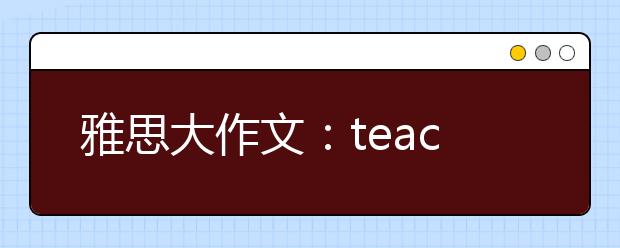 雅思大作文:teachers have more influence on children
雅思大作文:teachers have more influence on children
2020年雅思报考指南 雅思大作文题目:Once c
2021年10月08日 15:07 2019年9-12月 雅思口语 Part 1 Topic 6 Teachers 老师 (常考题)
2019年9-12月 雅思口语 Part 1 Topic 6 Teachers 老师 (常考题)
1. Do you have a favorite teacher? I do have a fav
2021年11月11日 23:17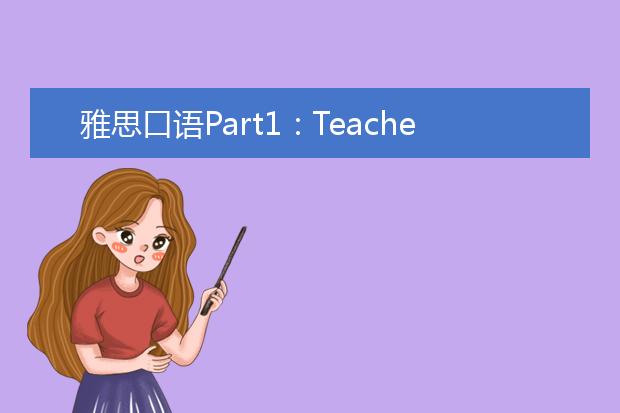 雅思口语Part1:Teachers 教师
雅思口语Part1:Teachers 教师
1.Do you think you could be a teacher? I don’t thi
2021年11月12日 04:44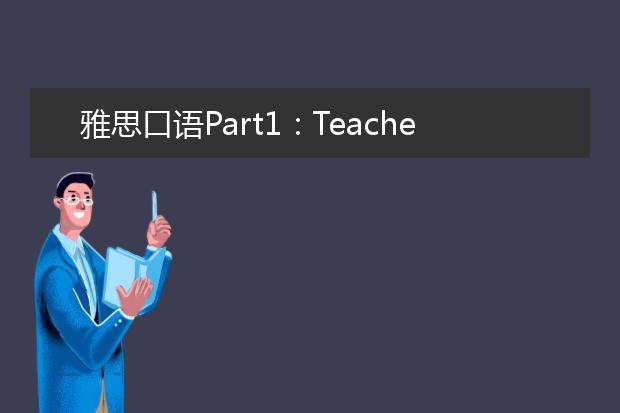 雅思口语Part1:Teachers教师话题
雅思口语Part1:Teachers教师话题
Do you have a favourite teacher? Why do you like t
2021年11月12日 05:44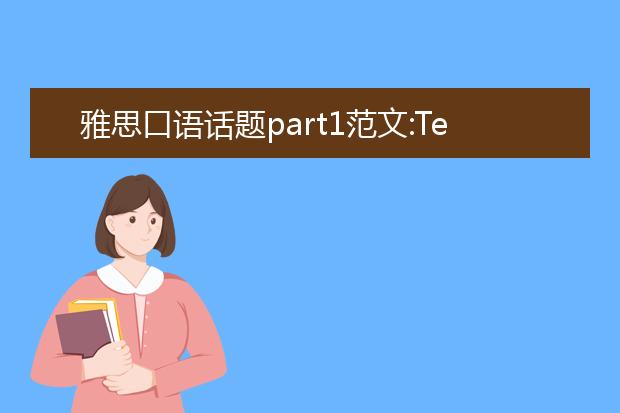 雅思口语话题part1范文:Teachers(老师)
雅思口语话题part1范文:Teachers(老师)
5月份已经过了大半了,雅思口语大部分新题也已经出来了,这个月还有考的各路考鸭速速归位。老师以迅雷不及
2021年11月23日 21:01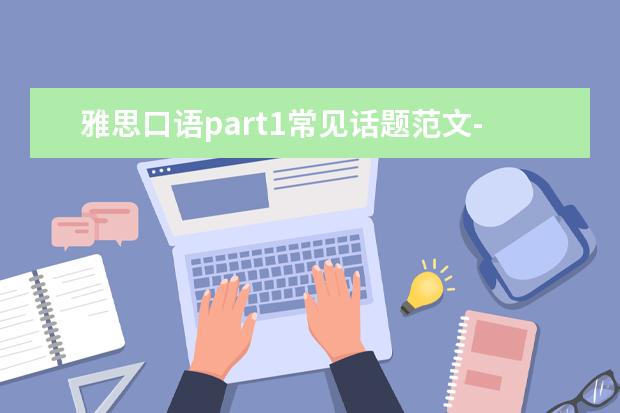 雅思口语part1常见话题范文-Teachers
雅思口语part1常见话题范文-Teachers
雅思考试主要是通过对考生听、说、读、写四个方面英语能力的考核,综合测评考生的英语沟通运用能力,实现“
2022年12月30日 07:00 雅思口语part1话题练习:Teachers
雅思口语part1话题练习:Teachers
雅思考试主要是通过对考生听、说、读、写四个方面英语能力的考核,综合测评考生的英语沟通运用能力,实现“
2022年12月30日 12:21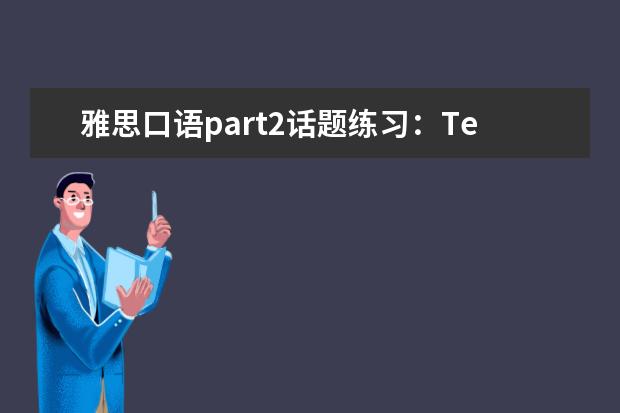 雅思口语part2话题练习:Teachers
雅思口语part2话题练习:Teachers
雅思考试主要是通过对考生听、说、读、写四个方面英语能力的考核,综合测评考生的英语沟通运用能力,实现“
2022年12月30日 13:33 雅思写作论据:Will Computers Replace Human Teachers?
雅思写作论据:Will Computers Replace Human Teachers?
雅思考试主要是通过对考生听、说、读、写四个方面英语能力的考核,综合测评考生的英语沟通运用能力,实现“
2023年01月17日 22:15 teachers teachers'和teacher's的区别是什么?
teachers teachers'和teacher's的区别是什么?
雅思考试主要是通过对考生听、说、读、写四个方面英语能力的考核,综合测评考生的英语沟通运用能力,实现“
2023年09月05日 12:42